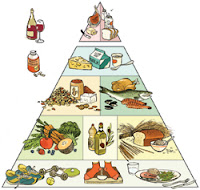 Overweight is the main problem for the people who are very
fat so people have to think about that because it carry’s lots of problem in their
life people think for their life if people think about that than it will be
good for them who have overweight and those people who are fat. So those people
who have overweight they have to think that how to lose the weight and how to
manage their body healthy.
Overweight is the main problem for the people who are very
fat so people have to think about that because it carry’s lots of problem in their
life people think for their life if people think about that than it will be
good for them who have overweight and those people who are fat. So those people
who have overweight they have to think that how to lose the weight and how to
manage their body healthy.
The best time for losing weight is when
a youngster is over 14 or 15 years of age. This coincides with a major concern
about one's appearance. A self-motivated teenager can follow a diet and lose
weight regardless of what the family eats. But, set a good example:
·
Change the foods you buy. Purchase more
2% milk, diet drinks, lean meats and extra fruits. Your teenager, however, has
to be in charge of how much you eat.
·
The combination of exercise and diet is
the most effective way to lose weight. Helpful exercise needs to occur 3 times
a week. Walking, swimming, and cycling are all good choices.
·
Most snacking occurs between 3 and 6
p.m. help your teenager fill after-school time with activities such as music,
drama, sports, or a part-time job.
·
If your teenager is having difficulty
getting motivated, suggest she join a weight-loss club such as Shape Down or
Weight Watchers. These are often available through local hospitals.
Poor eating habits can helps make teens overweight,
particularly if they live on fast food and high-calorie processed food? Studies
show that many teens eat more high-fat foods and fewer foods with necessary
nutrients (vitamin A, folic acid, fiber, iron, calcium, and zinc) than is
recommended for best health. Being overweight stems from a combination of poor
eating habits and a sedentary lifestyle. That means a lifestyle with too much
time spent in front of the computer or TV screen and too little time being
physically active.
Genetics as well as
play a place in weight. If one or dual of your parents are overweight or obese,
the opportunities are higher that the children
also be overweight but if the parents conscious about the fitness of their
child they should have to think how and what they can do for their child to not
be overweight. Sometimes, emotional distress can result in excess fat. Teens
may make bad food desires when they are upset, depressed, or anxious, turning
to cookies, candy bars, and potato chips for comfort. Stress may also trigger
eating binges.
Although few physical
differences emerged between the exercise groups over time, the teens did
self-report improvements in perceived scholastic competence, social competence,
and several markers of body image including appearance esteem and weight
esteem. According to Dr. Goldfield [citing related research], exercise induced
improvements in body image, perceived social and academic functioning are
psychologically empowering and may help buffer against some of the weight-based
teasing and discrimination and bias that's often inflicted on obese kids, which
can have devastating effects on their emotional well-being.




.png)

